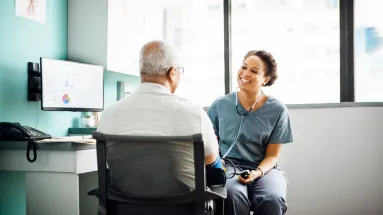Four Tips For Finding Medical Information Online
Four Tips For Finding Medical Information Online

People living with cancer may search online to learn about their disease and treatment options. There is a lot of information out there, however, for this information to be useful, it has to be reliable as well as understandable. Accurate and clear information can help people living with cancer play a more active role in their care plan and become more engaged in the scientific community.
Finding Reliable Medical Information
Medical information found online can be helpful, but sometimes, they might have the following problems: 1) complex medical words might cause confusion, 2) not all information is updated regularly, so it could be outdated, and 3) anyone can post online, which means certain sites may be incorrect.
It is possible to find reliable, clear medical information online by using some general tips and best practices:
- Look at the website address (URL): websites ending in “.edu” or “.gov,” for example, are run by organizations like universities or government agencies that are considered reliable sources of information. Websites that end in “.com” or “.org” can also be run by trusted organizations, but it is important to look into the organization if you do not know of it.
- Check whether the information is referenced: reliable websites often note where their information came from as well as when it was last reviewed and updated. Organizations like Health on the Net have tools that can check how reliable health websites are.
- Explore the motivation behind a website: far-fetched claims, like those of a ‘miracle cure,’ should make you suspicious.
- It’s important to take extra care in evaluating information on social media, because misinformation can spread very quickly on these platforms. Social media accounts run by professionals like doctors and scientists, or organizations (like hospitals, universities, government agencies, pharmaceutical companies, cancer professional societies) are typically more reliable resources. Social media can also be an important place to build awareness about diseases, and find community with others going through similar experiences – more on that below.
Some websites and resources that provide helpful, reliable information include:
- Cancer.Net: Cancer information from the American Society of Clinical Oncology (ASCO) that has been approved by oncologists
- Medline Plus: Cancer information from the U.S. National Library of Medicine, National Institutes of Health (NIH)
- National Cancer Institute (NCI): Cancer information from the NCI, part of the U.S. National Institutes of Health
- Cancer.org: Cancer information from the American Cancer Society (ACS)
- National Comprehensive Cancer Network (NCCN): Information for people living with cancer and their caregivers, from NCCN, a group of the country’s leading cancer centers
- Plain language summaries from medical journals (available online in association with certain scientific journals or from a doctor): Findings from research articles that are summarized simply, so people living with cancer can learn about the latest research on their disease.
The Power of Online Medical Information
Online research can be a powerful tool to help people living with cancer learn about their disease, research care options and become more involved in their healthcare decision-making. People who have done research can ask their care team more informed questions. This can lead to better doctor-patient conversations that may help them both agree on how to move forward with their care plan.
The internet is also home to communities and support groups, where people living with cancer can connect with others who have shared experiences. This may help reduce the isolation of living with this disease and make certain experiences feel more normal. Social media can also be helpful by raising awareness on prevention, screening and treatment of cancer through the use of hashtags and awareness days.
Lastly, online research could inspire people living with cancer to become involved in the scientific community, for instance through organizations like GRASP (Guiding Researchers and Advocates to Scientific Partnerships) people can learn about clinical research opportunities or share their unique views and experiences with researchers and doctors, as part of an “Everyone Included” approach to science. The scientific community is responding by sharing patient views and experiences more often in journal articles or at medical conferences. These activities help people living with cancer take part in the scientific conversation and ensure the patient voice is heard. Patient involvement in the research process and contribution to journal articles is becoming more common as scientists and patients realize the benefits of this collaboration.
An Improved Ecosystem
The internet can be a great way for people living with cancer to learn about their disease, raise awareness and get involved in research. But online resources must be both accurate and easy to understand. The good news is that people can find the right kind of information by following a few easy tips. This information can help people living with cancer communicate better with their care team and also join in the broader cancer conversation.













